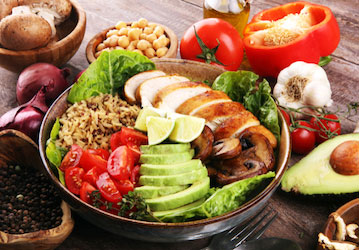Are you recovering from a recent injury or surgery that limits your activity? Rest and rehab are likely part of your recovery plan, but what you eat matters too. Just like performance nutrition helps you perform your best, rehabilitation nutrition helps you recover faster as part of a holistic treatment plan. Try the following fueling strategies to help optimize your recovery, minimize muscle loss, and prevent weight gain.
Eat enough, but not too much
Even if you’re not as active after an injury or surgery, your body still needs fuel to support the healing process. Depending on how much your activity decreases, you’ll likely have to dial back your calorie and carbohydrate intake to some extent. However, this isn’t the time to go on a strict diet because you still need calories and nutrients to help you heal. Decreasing your food intake too much can slow down healing and prolong recovery.
Be strategic with protein
In addition to its role in athletic performance, protein is one of the most important nutrients to support repair and recovery. Eating enough protein at the right times can help you preserve your muscle mass while also promoting the repair process. Eat at least 2 grams of protein per kilogram of body weight each day. For example, someone who weighs 170 pounds would need 155 grams of protein daily.
To get the most benefit from protein, eat smaller doses of 20–40 grams at frequent intervals throughout the day, such as over 3–4 meals or snacks. Good sources of protein include lean red meat, poultry, fish, dairy, eggs, beans, nuts, and seeds. Choosing protein sources high in leucine—such as dairy products, meats, and poultry—might be of additional benefit.
Choose fats that fight inflammation
Omega-3 fatty acids can be particularly helpful in managing inflammation after an injury or surgery. Foods high in omega-3s include salmon, sardines, tuna, herring, chia and flax seeds, and walnuts. Other fats that help with healing include unsaturated fats such as olive oil, avocados, nuts, and seeds.
Fuel up on nutrient-dense foods
There are many nutrients involved in the healing process, which is why it’s so important to eat a variety of nutrient-dense foods. Examples of vitamins and minerals that support tissue repair and recovery include Vitamins C and D, as well as zinc, potassium, and calcium. Polyphenols, which are beneficial nutrients found in fruits and vegetables, also help with healing.
To ensure you’re meeting your needs for these nutrients, choose deep-colored fruits and vegetables such as berries, cherries, leafy greens, cruciferous vegetables, and citrus. It’s also important to include quality protein and carbohydrates like whole grains, beans, dairy, legumes, and lean meats. HPRC’s Power Plate can help you create balanced, nutrient-dense meals.
Even if you’re not as active during rehab, remember to stay hydrated. Water is your best bet, but low-fat milk and other low-calorie drinks, as well as watery fruits and vegetables, can help meet your fluid needs to support recovery.
Prevent weight gain
If weight gain is a concern because you’re not as active, there are a few things you can do to keep your weight in check. While no food or beverage is off-limits, it’s best to minimize low-nutrient choices. Keep added sugars, trans fats, and highly-processed foods to a minimum. You might also want to limit or avoid alcohol because it is high in calories and can slow down the healing process. Instead, fill up on nutrient-rich whole foods such as fruits, vegetables, lean proteins, and complex carbohydrates.
Even if you choose to have an occasional treat, just be sure to keep your portion sizes in check. With less activity, your appetite should naturally adjust so you shouldn’t be quite as hungry. Consider HPRC’s additional fighting-weight strategies for more ideas on how to manage your weight.
Bottom line
In addition to physical rehabilitation and mental fitness, nutrition is an important part of a holistic approach to recovery from injury or surgery. Eating a variety of nutrient-dense foods provides optimal fuel to support the healing process.
